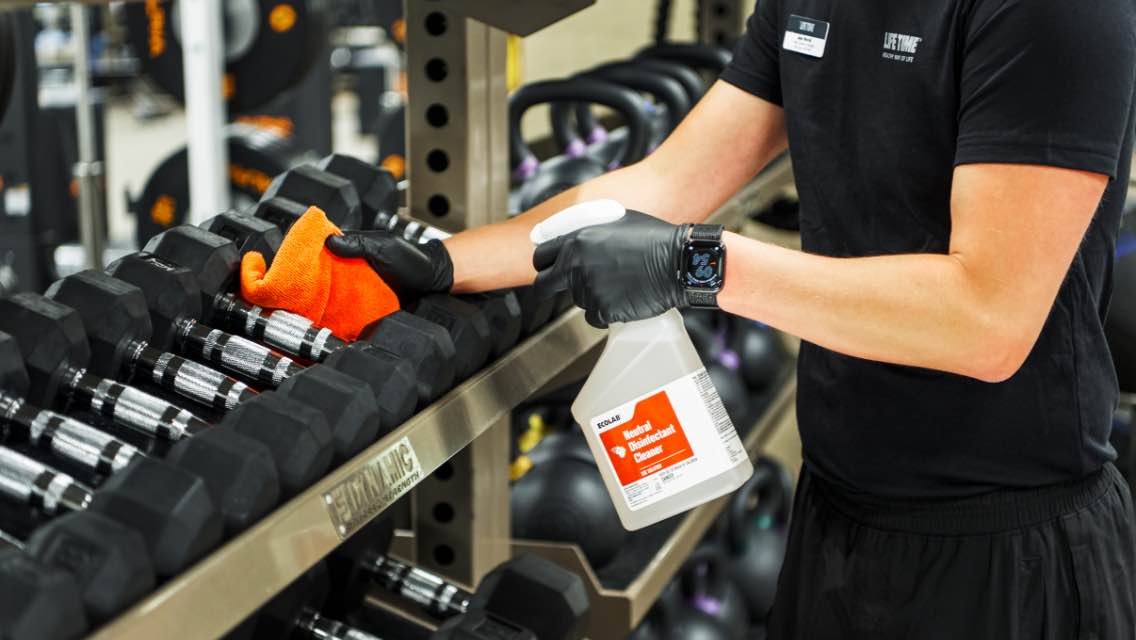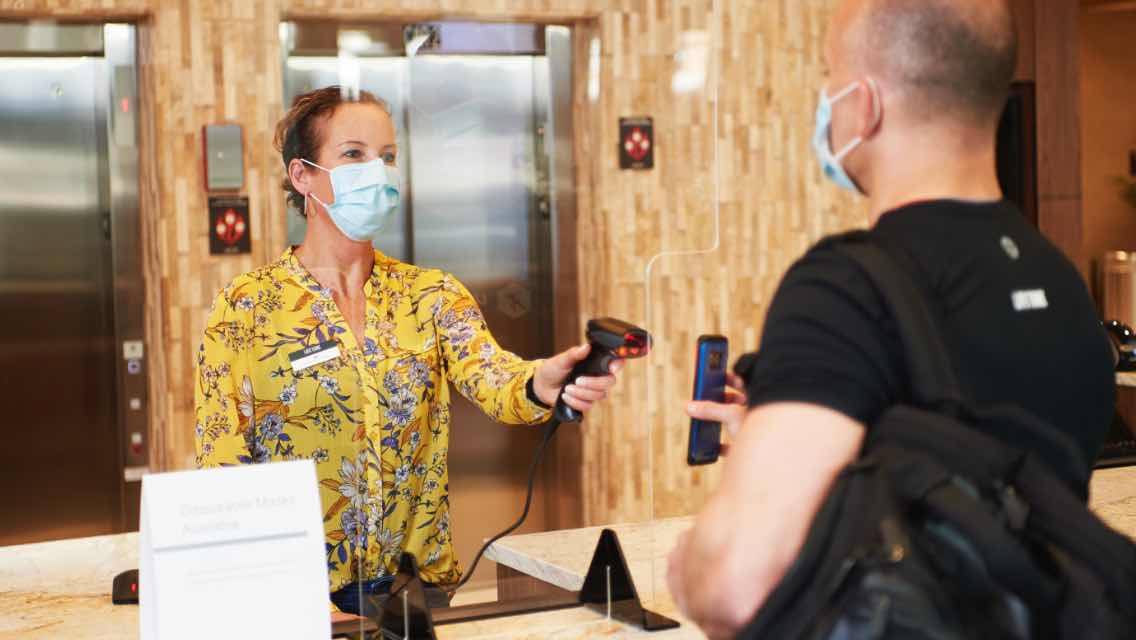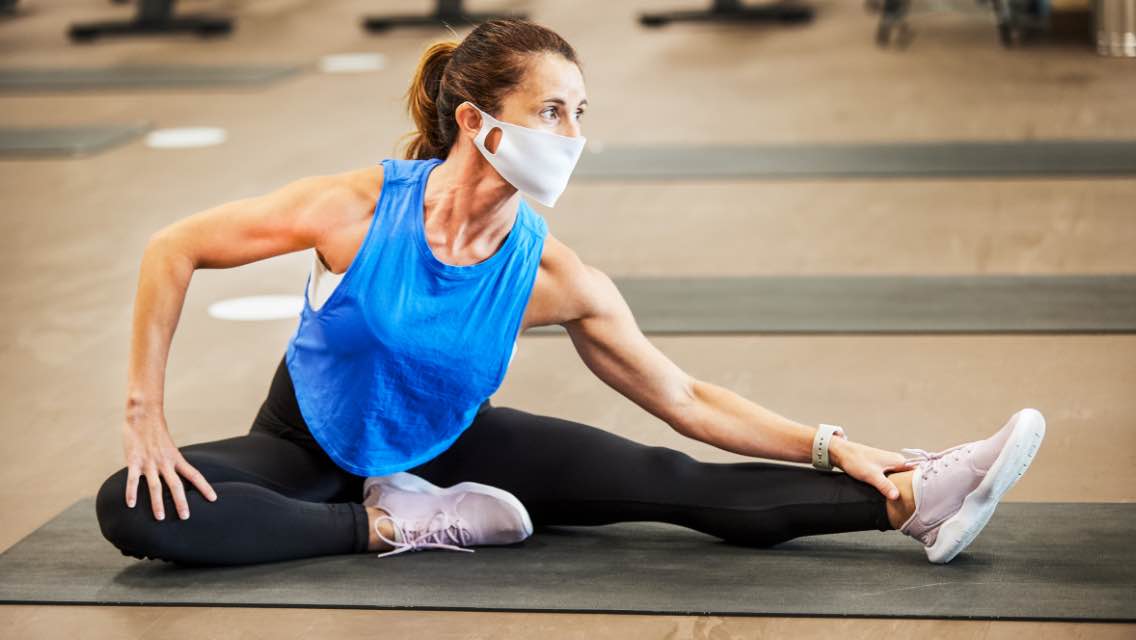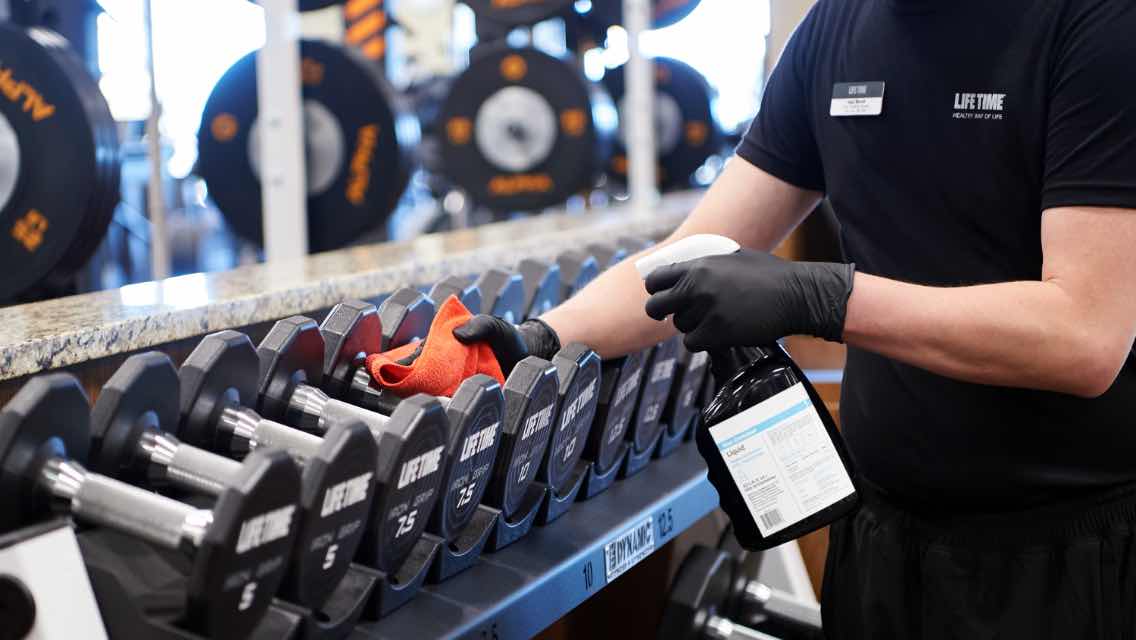Keeping public spaces — such as health clubs and the many spaces within them — safe from germs is a science that requires a rigorous, systematic approach, explains Catherine McLain, MS, a certified industrial hygienist with ATC Group Services. She regularly consults with Life Time’s facility operations team about maintaining healthy, safe environments for our members.
“We hear the terms ‘cleaning,’ ‘sanitizing,’ and ‘disinfecting’ thrown out and sometimes used interchangeably,” she says. But they are different processes, and different circumstances call for varying degrees of application. McLain cites the Centers for Disease Control and Preventions’ definitions for the terms:
Cleaning gets rid of visible soil and invisible germs from an area or object. “Cleaning involves mechanical action such as wiping or scrubbing and use of a general cleaner such as soap and water. This reduces the presence of germs by removing them,” she says. Though often performed on its own, cleaning is sometimes combined with disinfecting for a streamlined process.
Sanitizing kills germs to reduce the potential for infection. “Surfaces need to be cleaned before being sanitized or the sanitizer might not be effective because dirt, dust, and other material can inhibit the sanitizer’s contact with the object,” McLain states. “Sanitizers must be in contact with a surface or object for a certain amount of ‘dwell’ or ‘set’ time in order to effectively kill certain microbes.”
Sanitizers — which are regulated by the EPA as pesticides — do not kill as many pathogens as disinfectants, though they tend to be safer for people. When it comes to COVID-19, however, “Sanitizing is not sufficient,” says McLain.
Disinfecting also kills germs on surfaces, and disinfectants generally destroy more microbes than sanitizers. “For disinfectants to work properly, the area needs to be cleaned first. As with sanitizers, the amount of time the disinfectant is in contact with the surface is key,” McLain explains. “Like sanitizers, disinfectants are also regulated as pesticides by the EPA.”
So, what does all of this mean when it comes to Life Time’s cleaning protocols? First, McLain explains that cleaning and disinfecting are essential. “There is no need to sanitize and disinfect,” she says.
Based on current and ever-evolving information and guidelines, Life Time has implemented deep cleaning and enhanced cleaning protocols (ECP). The former happens midday and overnight, while the latter occur continuously throughout the day and in every area of the health club.
This includes the use of an EPA-approved virus-killing product that has been shown to be effective on a harder-to-kill pathogen than SARS-CoV-2 (which causes COVID-19). It is used in healthcare and industrial settings, and is food-safe.
The liquid spray is applied to all hard nonporous surfaces, including high-touch areas — handles, railings, equipment, buttons, etc. — every 30 minutes, with a suggested dwell time of 60 seconds prior to wiping. It does not leave behind harmful residue.
Though all areas of the clubs have ECPs in place, here are some of the specifics for certain shared spaces:
- Fitness Floor/Personal and Small Group Training: In addition to more cleaning stations for member use, which is encouraged before and after machine use, there is also a dedicated fitness floor cleaning attendant who makes sure machines are wiped down regularly. Fitness professionals who lead one-on-one and small-group sessions are responsible for using an approved cleaner to wipe down all equipment before and after use; equipment cannot be shared until it is disinfected. There is also scheduled time each day for additional cleaning and disinfecting.
- Group Fitness Studios: A Group Fitness attendant is responsible for not only cleaning and disinfecting the studio and equipment between each class, but also preparing the space and helping members find their reserved spot, where gear is set out for them in advance.
- Locker Rooms: There are now full-time locker-room attendants who are focused on continuous cleaning and disinfecting of high-touch surfaces like countertops. Showers are cleaned and disinfected multiple times per hour.
- Child Center/Kids Academy: All high-touch surfaces are cleaned and disinfected on an hourly basis, or as needed. Deep cleaning of all amenities, toys, and devices occurs nightly.
Regardless of their position, all Life Time team members play a role in keeping our spaces clean and safe for you.




